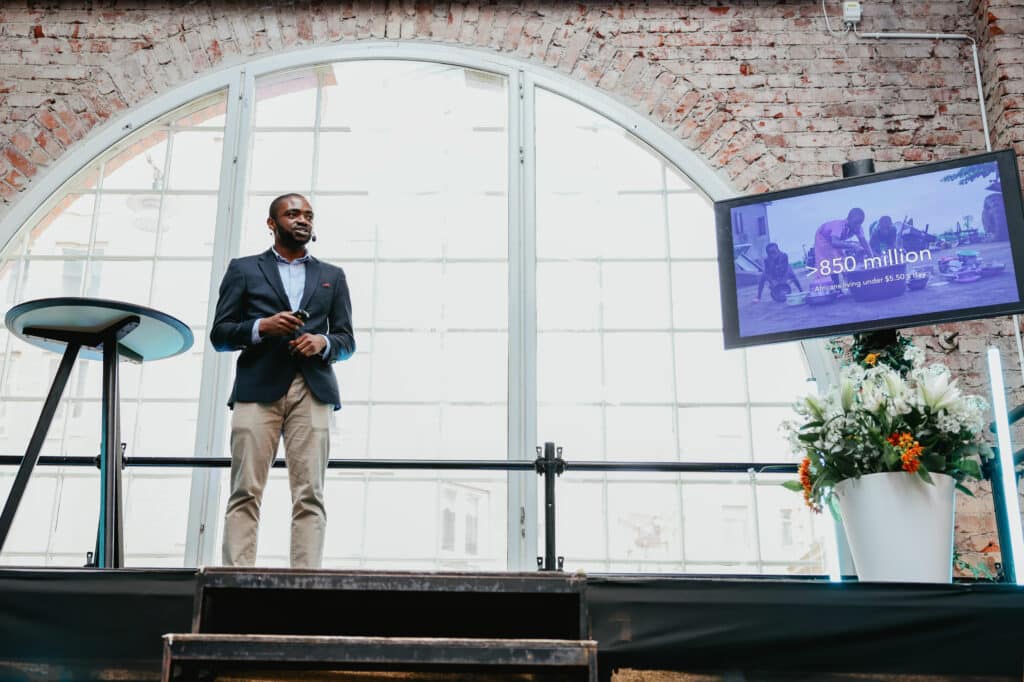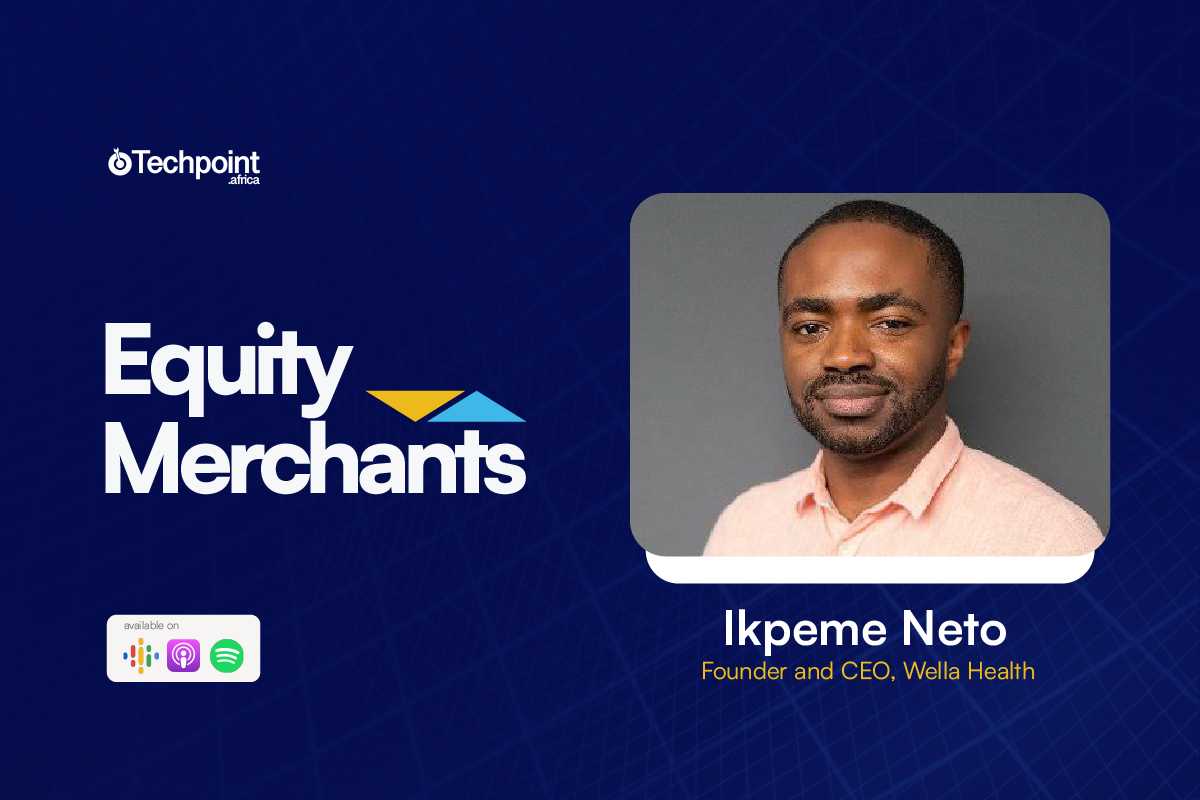For all its faults, Twitter is an incredibly useful tool for learning and discovering interesting people, and that’s where I found my guest for today’s episode of Equity Merchants.
Dr Ikpeme Neto is an internal medicine physician and the founder of WellaHealth, a Nigerian healthtech startup providing affordable healthcare coverage.
Being an entrepreneur may seem like a glamorous role today thanks to their portrayal in the media, but Neto had no plans of becoming one as he rounded up his training as a medical doctor. Yet, four years after graduation, he was setting up WellaHealth to solve a problem that he cared deeply about.
“I think if I’d projected my career when I was in medical school, if I projected it forwards, I would never have thought I’d start a business, and so it was kind of something that just happened because I wanted to solve a problem that was very personal to me and that I was passionate about.
And it became obvious very quickly that starting a business was the best way to solve that problem. I’d gone through the metrics of things [I could do] and I figured that the best way to do it was to start a business.”
In addition to solving a problem in the healthcare industry, he saw starting WellaHealth as a way to extend his impact.
Medical doctors work long hours and a 2012 study showed that most primary care physicians in the US saw between 11 and 20 patients a day. Throughout a 30-year career, they could see as many as 156,000 patients. But with a startup, that number increases exponentially. Since its inception, more than 90,000 people have used WellaHealth’s solutions.
“I always felt like I needed to impact people on a large scale so my impact when I finish my career is in the hundreds of thousands. I had that inborn desire early on and I very quickly realised that sitting in a clinic every day wouldn’t get me there. At best I’d see a few thousand, maybe 10,000 patients.”
Although he no longer practices actively, he credits his training as a medical doctor to building his penchant for hard work and helping him develop strong research skills.
“One of the advantages of training to be a doctor is that you learn to absorb a lot of information. If there’s one thing I know, it’s that I have a lot of knowledge and medicine prepared me for that. I’ve been taught how to find knowledge. A lot of people don’t know how to find knowledge but I’m very good at that.”
Is there a right time to raise capital?

On the second Friday of every month, Techpoint Africa hosts a pitch event — Pitch Friday — where founders share the solutions they’re working on. A common theme I see is that founders come up with an idea and within a few weeks are on the hunt for potential investors.
Per Crunchbase, WellaHealth has raised almost one million dollars from investors such as Techstars and Google for Startups, so Neto knows a thing or two about raising venture capital.
On timing, he notes that there isn’t a one-size-fits-all approach and different companies would require different approaches depending on factors like the market size and their sector. However, he says it is often better that startups have a clear idea of what they are about before raising venture capital.
“I don’t think there’s a one size fits all answer here because the response is definitely dependent on the markets, the products, the timing, all of these variables. The rule and framework that I subscribe to is that of figuring out as much as you can on your own before going outside to look for external support.
“And I mean that to say that you want to make some meaningful progress because whether it’s easy or hard to raise money, what money is looking for, what venture capital is looking for is a return and so the easier and quicker you can give venture capital that return, the easier it is on the journey.”
Without figuring out the business fundamentals first, he says, startups will use venture capital to do so, which could increase their chances of failure. He also points out that founders often come under pressure to get things right, while they frequently give up significant equity.
Consequently, he advises early-stage founders to bootstrap for as long as they can.
“Go and figure out the markets, do customer discovery, build with the market, sell a product, get some revenue. And I would say that [is more beneficial] in the long term.”
When I ask what surprised him whenever he was raising funds for WellaHealth, he says he wasn’t prepared for how long it took to close a round and advises founders to brace for a long period of fundraising.
“I wasn’t prepared for how long it would take and how difficult it would be. You read TechCrunch and say, “Everybody’s raising millions; this must be so easy.” If there’s one thing anybody [reading] this should take away, it’s that raising VC is very difficult. It will take you a long, long time to do it.”
Patient for returns, impatient for progress
Most VC funds have a life cycle of ten years and expect their investments to mature within this period. However, many African startups would require a longer time due to the state of Africa’s economic development. This has led to many founders pointing out that African startups need patient capital to grow.
Neto holds the same opinion. With many African founders building the infrastructure that powers their industries, he points out that investors need to be patient for returns.
“Patient capital is really important,” he says, “what that means is that you gotta be patient for returns but impatient for progress. And the reason for that is that we are doing very foundational stuff.
“A lot of us are building infrastructure and it takes time to build infrastructure. I would say that perhaps the industry where there isn’t as much infrastructural deficit is actually fintech, and that’s why you’re seeing fintechs raise a lot of money.”
Spurring investments in healthcare
Healthtech startups raised $181 million in 2022 according to Partech Africa, ten times less than fintech startups did. That has been a constant theme for a while and Neto believes that specialist investors are required to spur investments in the sector.
“I would say that there isn’t enough understanding. A lot of the investors are generic investors. They don’t really understand healthcare. And the challenge with that is if I go to a generic investor to start to describe, ‘Oh, there’s primary healthcare, there’s secondary care, there’s tertiary healthcare,’ people can get very lost.”
The traditional nature of healthcare is another reason he thinks investments in healthcare startups are lower than in other sectors. While there have historically been private equity investments in healthcare, he notes that investors are reluctant to invest in digital solutions, but expresses hope that exits in the space would encourage more investors.
The healthtech sector is not the only one where Neto believes there’s a knowledge gap on the part of investors, and with more young people building startups, he advises that people who nurse dreams of starting a startup get a job first.
“I think it’s important that you earn your stripes in the industry, that you understand the nuances so that the knowledge gap that we say is there, isn’t there. Try and work somewhere before you go try to start your own company.”
Still, he thinks that as more founders gain experience and record successes, they could guide a new generation of African founders.
Tapping academia to drive business success
It’s an open secret that the African educational system leaves so much to be desired. Universities are often chided for turning out graduates who still require more training to fit into the workplace. While there have been attempts to get business and academia to work together, Neto stresses that the problem of funding for the schools makes this difficult. He also suggests that the focus be shifted to business academics since most of the innovation done in Nigeria is more business model innovation than technological.
“A lot of the technology innovation that is happening is not happening in Nigeria. We’re basically just bringing existing technology and trying to use business model innovation to actually further whatever goals or solve whatever problems we have. And so I think that maybe the disconnect is that, the types of academics that we need are actually business academics not so much engineering or technical.”
Closing the gender funding gap
Men are more likely to raise venture capital in Africa than women, but Neto has a unique thought process about this. In a 2021 article, he argued that while there was a huge mismatch in funding that went to female founders, the healthtech sector was much better.
In 2021, 36.8% of the 19 healthtech startups that received funding had a female CEO, a significant difference from the general average and he attributes this to the higher number of women in the healthcare sector.
“People talk about the gender gap in funding, which is true, but if you break that down a little bit more, what you realise is that the bulk of the funding goes to fintech. And who are the people that are funding fintech companies? It’s people that have financial experience. Who are the people that have financial experience? Well, they’re men. You go to your average bank, who’s working there on the product side or the engineering side? Mostly men.
So if you’re gonna fund fintech the most, invariably you’re gonna fund men. That’s just the way it is. Now if you come to healthcare where the gender split is a bit more even, in fact, there are more women in healthcare than men. Of course, if you just close your eyes and fund a healthcare company, you’re more likely to hit a woman.”
In addition to funding sectors where women are more likely to start businesses, he points out that closing the gender gap in education will also go a long way in addressing the bigger problem of funding women.






